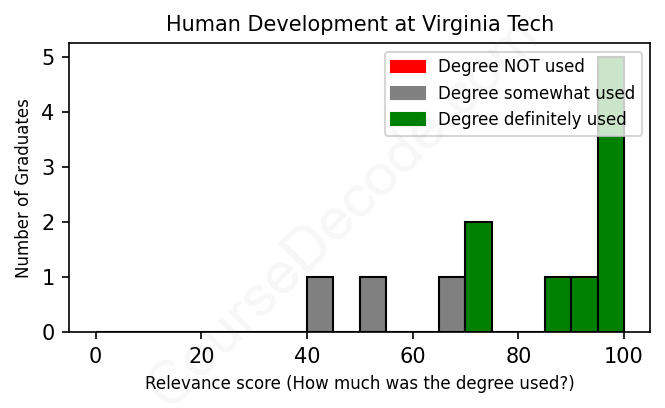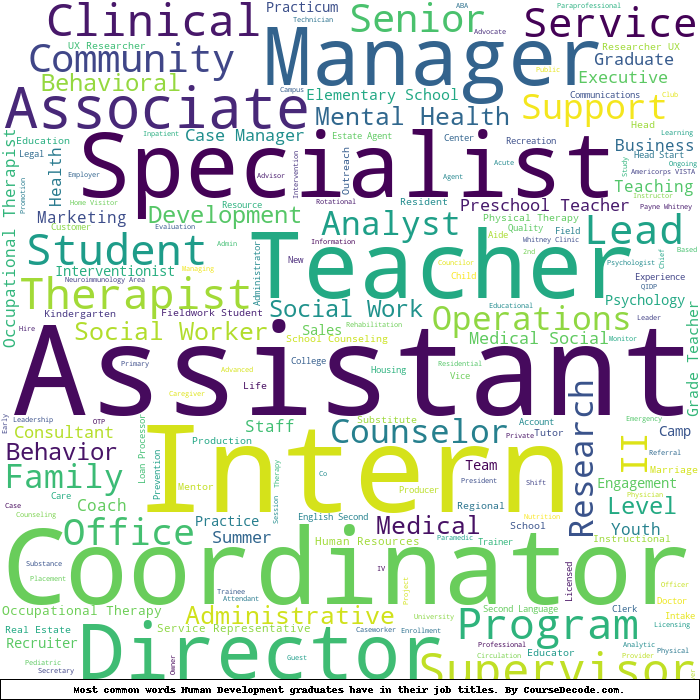
First, some facts. Of the Human Development graduates from Virginia Tech we've analyzed , here's how many have used (or NOT used) their degree in their career:

These are estimates based on AI analysis of 12 LinkedIn profiles (see below).
The verdict? Significantly above average. Overall, with an average relevance score of 81%, Human Development graduates from Virginia Tech have a much higher likelihood (+14%) of finding work in this field compared to the average graduate across all fields:
And for comparison, here's the chart for all profiles we've looked at across all degrees.
Also, after graduating, 75% of these graduates have pursued further education other than another Bachelor's degree (such as a Masters degree or other), compared to the average across all profiles of 35%. This suggests you may need more than just a Bachelors degree to be competitive as a Human Development graduate.
See the details:
|
Relevance score: 86% We think this person has gone into a career highly relevant to their degree. We think this person has gone into a career highly relevant to their degree.
DEGREE INFOGraduated in 2018 from Virginia Tech with a Bachelor of Science - BS in Human Development. Also pursued further education since (see below). JOB HISTORY SINCE GRADUATIONMedical Assistant NORTHERN VIRGINIA FAMILY MEDICINE Jul 2019 - Jul 2020 Infection Prevention  UVA Health Jan 2022 - Apr 2022 Disease Intervention Specialist  Virginia Department of Health Jan 2022 - Present FURTHER DEGREES DONE SINCE GRADUATINGMaster of Public Health - MPHGeorge Mason University 2020 - 2022 ABOUTNo information provided. |
The top 10 most common jobs done by the graduates we've analyzed (ranked most common to least) are:
After looking through the job types that recent graduates from Virginia Tech with a degree in Human Development have taken on, it’s clear that many of them have gravitated toward education and counseling roles. A good chunk of these alum are working as teachers, school counselors, or within community support frameworks like church services. These jobs are pretty relevant because they apply the principles of human growth, development, and teaching methods that the students learned during their studies. Positions like behavior analysts, health promotion coordinators, and counselors also show a strong link to the degree, as they involve helping individuals and communities flourish.
However, not every job seems to mesh well with a Human Development background. Some individuals have found themselves in roles that don’t really tap into the core skills or knowledge from their degree, like being a travel consultant or a beauty advisor. A few others have taken on positions that are somewhat related but lean more toward general management or customer service rather than a deep application of human development principles. So, while there are definitely pathways that align closely with the degree, it’s clear that graduates sometimes stray into areas that aren’t as relevant to what they studied.
Here is a visual representation of the most common words in job titles for Human Development graduates (this is across all Human Development graduates we've analyzed, not just those who went to Virginia Tech):

Many graduates from the Human Development program at Virginia Tech tend to follow diverse career paths that often revolve around education, healthcare, and community service. Right after graduation, you’ll typically find these individuals stepping into roles like teaching or counseling. For instance, a lot of recent graduates have found themselves working in schools—either as teachers or counselors—and getting involved in community initiatives, such as with programs like Americorps or Ronald McDonald House Charities. This shows that the foundational skills they gained during their studies are directly translating into their first jobs, aligning well with their degree.
As time goes on, about five to ten years into their careers, many of these graduates continue to grow and take on more specialized roles. You see them moving into positions like behavior analysts or health coordinators, which align closely with the principles of human development. Some have even taken on leadership roles in educational settings or nonprofit organizations, indicating career progression. However, there are a few who venture off into unrelated fields or roles that don’t leverage their degree directly, like a position at Ulta Beauty or as a travel consultant. Overall, while some may drift away, a significant number are making impactful contributions in areas related to their education, which is pretty promising! It shows that with a Human Development degree from Virginia Tech, there's a solid pathway for pursuing meaningful careers in various sectors that emphasize human growth and community support.
Honestly, a Bachelor’s degree in Human Development can be a mixed bag when it comes to difficulty. At places like Virginia Tech, you'll find that the coursework covers a lot of ground—stuff like psychology, family studies, and even some sociology—so it can feel a bit challenging if you're not super into that kind of material or aren’t used to writing papers and doing group projects. It’s probably not the hardest degree out there, but it definitely requires consistent effort and a genuine interest in understanding people and their behaviors. If you stay organized and engaged, it’s totally doable, and some students find it pretty enjoyable!
Most commonly, in the LinkedIn profiles we've looked at, it takes people 4 years to finish a Bachelor degree in Human Development.
Looking at the job paths of these Virginia Tech Human Development graduates, it seems like many of them are in fields where salaries can vary quite a bit, but there's a mix of solid and modest earning potential. For instance, teachers generally make a decent salary after a few years, but it might not be high compared to other professions, while roles in health and behavioral analysis tend to pay better, especially as they gain experience. Positions like the Senior Clinical Director of Operations and the various counselor roles could lead to better pay as well. However, some early jobs they held, like teaching in smaller communities or internships, likely didn’t bring in a lot of cash. Overall, it looks like they’re working their way up, and while some might be comfortable, others could be facing the classic “doing what you love” challenge versus making bank.
Here is a visual representation of the most common words seen in the "about" section of LinkedIn profiles who have a Bachelor degree in Human Development (this is across all Human Development graduates we've analyzed, not just those who went to Virginia Tech). This may or may not be useful:

Here are all colleges offering a Bachelor degree in Human Development (ordered by the average relevance score of their Human Development graduates, best to worst) where we have analyzed at least 10 of their graduates:
| College | Score | Count |
|---|---|---|
 Virginia Tech Virginia Tech
|
81 | 12 |
 University of California, Davis University of California, Davis
|
61 | 13 |
 Binghamton University Binghamton University
|
59 | 14 |